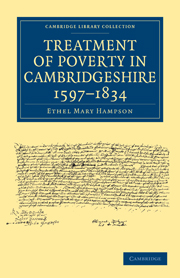Book contents
- Frontmatter
- Contents
- LIST OF ILLUSTRATIONS
- Preface
- EDITOR'S PREFACE
- CHAPTER I INTRODUCTORY: POOR RELIEF IN CAMBRIDGESHIRE BEFORE 1597
- CHAPTER II POOR RELIEF IN CAMBRIDGE DURING THE FIRST PART OF THE SEVENTEENTH CENTURY
- CHAPTER III POOR RELIEF IN WISBECH DURING THE FIRST PART OF THE SEVENTEENTH CENTURY
- CHAPTER IV POOR LAW ADMINISTRATION IN THE RURAL AREAS DURING THE FIRST PART OF THE SEVENTEENTH CENTURY
- CHAPTER V WAGE PROBLEMS. THE PROFITABLE EMPLOYMENT OF THE POOR. FIRST PHASE OF THE MOVEMENT
- CHAPTER VI HOUSING PROBLEMS AND PAUPER LABOUR IN CAMBRIDGESHIRE IN THE EARLY EIGHTEENTH CENTURY. THE ISLE OF ELY AND THE STATUTE OF 1723
- CHAPTER VII THE WORKHOUSE MOVEMENT IN THE TOWNS OF CAMBRIDGE AND ROYSTON, 1723–1785
- CHAPTER VIII THE WORKHOUSE MOVEMENT IN RURAL CAMBRIDGESHIRE, 1723–1785
- CHAPTER IX THE URBAN WORKHOUSES OF CAMBRIDGESHIRE, 1785–1834
- CHAPTER X THE RURAL WORKHOUSES OF CAMBRIDGESHIRE, 1785–1834. PARLIAMENTARY REPORTS OF 1804 AND 1834
- CHAPTER XI SETTLEMENT AND REMOVAL, 1660–1834
- CHAPTER XII PAUPER APPRENTICESHIP
- CHAPTER XIII BASTARDY
- CHAPTER XIV RELIEF OUTSIDE THE WORKHOUSE, 1660–1782
- CHAPTER XV RELIEF OUTSIDE THE WORKHOUSE, 1782–1834
- CHAPTER XVI CONSTITUTIONAL STRUCTURE AND SOCIAL POLICY
- CHAPTER XVII CONCLUSIONS
- APPENDIX
- MS. Sources and Bibliography
- Index of Names
- Index of Places
- Index of Special Subjects
- Plate section
CHAPTER X - THE RURAL WORKHOUSES OF CAMBRIDGESHIRE, 1785–1834. PARLIAMENTARY REPORTS OF 1804 AND 1834
Published online by Cambridge University Press: 07 September 2010
- Frontmatter
- Contents
- LIST OF ILLUSTRATIONS
- Preface
- EDITOR'S PREFACE
- CHAPTER I INTRODUCTORY: POOR RELIEF IN CAMBRIDGESHIRE BEFORE 1597
- CHAPTER II POOR RELIEF IN CAMBRIDGE DURING THE FIRST PART OF THE SEVENTEENTH CENTURY
- CHAPTER III POOR RELIEF IN WISBECH DURING THE FIRST PART OF THE SEVENTEENTH CENTURY
- CHAPTER IV POOR LAW ADMINISTRATION IN THE RURAL AREAS DURING THE FIRST PART OF THE SEVENTEENTH CENTURY
- CHAPTER V WAGE PROBLEMS. THE PROFITABLE EMPLOYMENT OF THE POOR. FIRST PHASE OF THE MOVEMENT
- CHAPTER VI HOUSING PROBLEMS AND PAUPER LABOUR IN CAMBRIDGESHIRE IN THE EARLY EIGHTEENTH CENTURY. THE ISLE OF ELY AND THE STATUTE OF 1723
- CHAPTER VII THE WORKHOUSE MOVEMENT IN THE TOWNS OF CAMBRIDGE AND ROYSTON, 1723–1785
- CHAPTER VIII THE WORKHOUSE MOVEMENT IN RURAL CAMBRIDGESHIRE, 1723–1785
- CHAPTER IX THE URBAN WORKHOUSES OF CAMBRIDGESHIRE, 1785–1834
- CHAPTER X THE RURAL WORKHOUSES OF CAMBRIDGESHIRE, 1785–1834. PARLIAMENTARY REPORTS OF 1804 AND 1834
- CHAPTER XI SETTLEMENT AND REMOVAL, 1660–1834
- CHAPTER XII PAUPER APPRENTICESHIP
- CHAPTER XIII BASTARDY
- CHAPTER XIV RELIEF OUTSIDE THE WORKHOUSE, 1660–1782
- CHAPTER XV RELIEF OUTSIDE THE WORKHOUSE, 1782–1834
- CHAPTER XVI CONSTITUTIONAL STRUCTURE AND SOCIAL POLICY
- CHAPTER XVII CONCLUSIONS
- APPENDIX
- MS. Sources and Bibliography
- Index of Names
- Index of Places
- Index of Special Subjects
- Plate section
Summary
BOTTISHAM
It is interesting to compare with the urban workhouses of two towns so widely dissimilar in many ways as Cambridge and Royston, the workhouse of an energetic rural parish.
In 1786 it was decided that the earlier poorhouse at Bottisham was useless from the point of view of work, and that it was therefore necessary to “erect and establish a workhouse, the poor being numerous and at this time very chargeable”. The expense was to be met by a rate. Six adjoining cottages were acquired at Lode and the needful alterations undertaken. The old poorhouse was retained, and one or two aged pensioners who were boarded-out with parishioners were left undisturbed. All poor who were capable of work, however, were offered the house, and the payment of rents by the parish ceased.
A Master was appointed at wages of about £ 1 per month. His duties at this date were strictly supervisory. There were fifteen paupers in the house in 1787.
If the food purchased by the overseer always reached its correct destination the diet was generous. About 3 lb. of beef per person seems to have been consumed weekly. Limited quantities of beans, eggs, milk, pork, potatoes and ale, and considerable quantities of “seconds” and “thirds” flour appear in the accounts. A suspiciously liberal supply of cheese came from the dairy of Mr Watson, the overseer, whilst the barrels of beer were purchased from Mr Rayment, the other overseer.
- Type
- Chapter
- Information
- Treatment of Poverty in Cambridgeshire, 1597–1834 , pp. 113 - 123Publisher: Cambridge University PressPrint publication year: 2009First published in: 1934



